Discover Anti-Inflammatory Power in Vegan Foods
Introduction
Inflammation is a natural response of the body’s immune system to injury, infection, or irritation. However, chronic inflammation can lead to a host of health problems, including heart disease, diabetes, arthritis, and even cancer. In recent years, the spotlight has turned toward diet as a key player in managing inflammation. A vegan diet, rich in plant-based foods, offers numerous anti-inflammatory benefits. This article delves into the anti-inflammatory power of vegan foods and how they can contribute to overall health and well-being.
The Science Behind Inflammation
To understand the role of vegan foods in combating inflammation, it is essential to understand how inflammation works. Acute inflammation is a short-term response to injury or infection, where the immune system sends white blood cells to the affected area to promote healing. Chronic inflammation, on the other hand, is a prolonged state of inflammation that can damage healthy tissues and organs.
Chronic inflammation can be triggered by various factors, including poor diet, stress, lack of exercise, and environmental toxins. Over time, this persistent inflammation can lead to the development of chronic diseases. Thus, it is crucial to adopt dietary practices that can help mitigate inflammation.
The Role of Diet in Inflammation
Diet plays a significant role in either promoting or reducing inflammation. Foods high in saturated fats, trans fats, and refined sugars can exacerbate inflammation, whereas foods rich in antioxidants, fiber, and healthy fats can help reduce it. A vegan diet, which excludes animal products, focuses on plant-based foods that are naturally high in anti-inflammatory compounds.
Key Anti-Inflammatory Compounds in Vegan Foods
Several compounds found in plant-based foods contribute to their anti-inflammatory properties. These include:
Antioxidants
Antioxidants are molecules that neutralize free radicals, which are unstable compounds that can cause oxidative stress and inflammation. Fruits, vegetables, nuts, and seeds are rich in antioxidants such as vitamin C, vitamin E, and polyphenols.
Omega-3 Fatty Acids
Omega-3 fatty acids are essential fats known for their anti-inflammatory effects. While they are commonly found in fish, plant-based sources include flaxseeds, chia seeds, hemp seeds, and walnuts.
Fiber
A high-fiber diet supports gut health, which is closely linked to inflammation. Fiber-rich foods help nourish beneficial gut bacteria, which play a role in regulating the immune system and inflammation. Whole grains, legumes, fruits, and vegetables are excellent sources of fiber.
Phytochemicals
Phytochemicals are bioactive compounds found in plants that have health-promoting properties. They include flavonoids, carotenoids, and lignans, which have been shown to reduce inflammation and oxidative stress.
Top Anti-Inflammatory Vegan Foods
Incorporating a variety of plant-based foods into your diet can help harness their anti-inflammatory potential. Here are some top vegan foods known for their anti-inflammatory properties:
Berries
Berries such as blueberries, strawberries, and raspberries are rich in antioxidants and polyphenols, which help combat inflammation. These fruits also have a low glycemic index, making them a healthy choice for managing blood sugar levels.
Leafy Greens
Leafy greens like spinach, kale, and Swiss chard are packed with vitamins, minerals, and phytochemicals. They contain high levels of vitamin K, which has been shown to have anti-inflammatory effects.
Turmeric
Turmeric, a vibrant yellow spice commonly used in Indian cuisine, contains curcumin, a powerful anti-inflammatory compound. Curcumin has been extensively studied for its ability to reduce inflammation and improve symptoms of arthritis and other inflammatory conditions.
Ginger
Ginger is another spice with potent anti-inflammatory properties. It contains gingerol, a bioactive compound that has been shown to reduce inflammation and pain, particularly in conditions like osteoarthritis.
Nuts and Seeds
Nuts and seeds, including almonds, walnuts, flaxseeds, and chia seeds, are excellent sources of healthy fats, fiber, and antioxidants. They have been linked to reduced markers of inflammation and improved heart health.
Whole Grains
Whole grains such as quinoa, brown rice, and oats are rich in fiber and nutrients. Unlike refined grains, they help reduce inflammation by stabilizing blood sugar levels and promoting a healthy gut microbiome.
The Benefits of a Vegan Diet for Inflammation
Adopting a vegan diet can offer numerous benefits for managing inflammation and promoting overall health:
Reduced Risk of Chronic Diseases
A diet rich in plant-based foods has been associated with a lower risk of chronic diseases such as heart disease, diabetes, and certain cancers. The anti-inflammatory properties of vegan foods play a significant role in this protective effect.
Improved Gut Health
The fiber and phytochemicals in plant-based foods support a diverse and healthy gut microbiome. A balanced microbiome is essential for regulating the immune system and reducing inflammation.
Weight Management
Vegan diets are often lower in calories and saturated fats, making them effective for weight management. Maintaining a healthy weight is crucial for reducing inflammation and the risk of chronic diseases.
Enhanced Nutrient Intake
By focusing on a variety of plant-based foods, a vegan diet can provide an abundance of essential nutrients, including vitamins, minerals, and antioxidants, all of which contribute to reducing inflammation.
Practical Tips for Adopting an Anti-Inflammatory Vegan Diet
Transitioning to a vegan diet focused on reducing inflammation can be both rewarding and enjoyable. Here are some practical tips to get started:
Focus on Whole Foods
Prioritize whole, minimally processed foods such as fruits, vegetables, whole grains, nuts, and seeds. These foods are naturally rich in anti-inflammatory compounds.
Include a Variety of Colors
Incorporate a rainbow of fruits and vegetables into your meals. Different colors often indicate different phytochemicals and nutrients, providing a broad spectrum of anti-inflammatory benefits.
Experiment with Spices
Spices like turmeric, ginger, and cinnamon are potent anti-inflammatory agents. Use them to enhance the flavor and health benefits of your dishes.
Limit Processed Foods
Processed vegan foods, such as mock meats and snacks, can be high in unhealthy fats and additives. Limit their consumption and opt for whole, natural foods instead.
Stay Hydrated
Proper hydration is essential for overall health and reducing inflammation. Aim to drink plenty of water throughout the day and include hydrating foods like cucumbers and watermelon.
Conclusion
Embracing a vegan diet rich in anti-inflammatory foods can have profound effects on your health and well-being. By incorporating a diverse range of plant-based foods, you can harness the power of antioxidants, omega-3 fatty acids, fiber, and phytochemicals to reduce inflammation and lower the risk of chronic diseases. With mindful choices and a focus on whole foods, you can enjoy the benefits of a vegan lifestyle while promoting a healthier, inflammation-free body.

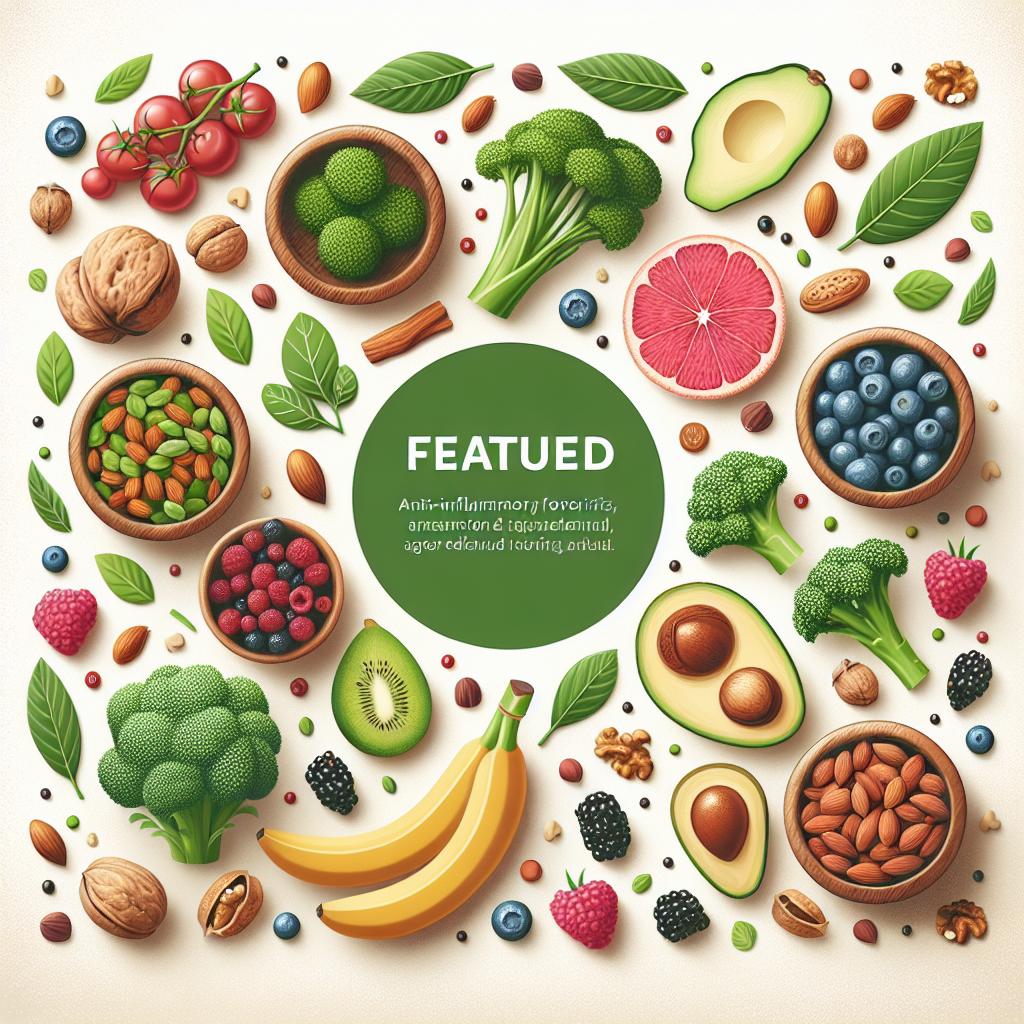


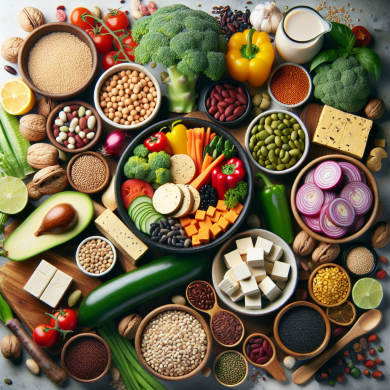

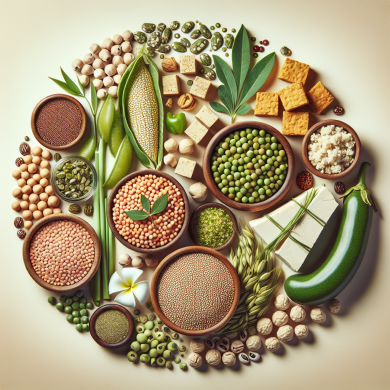
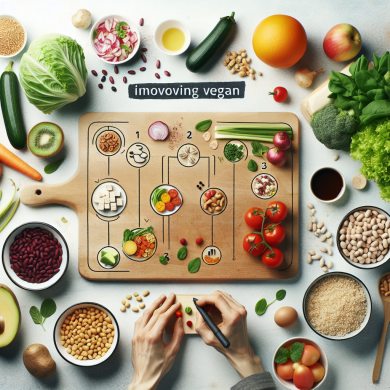
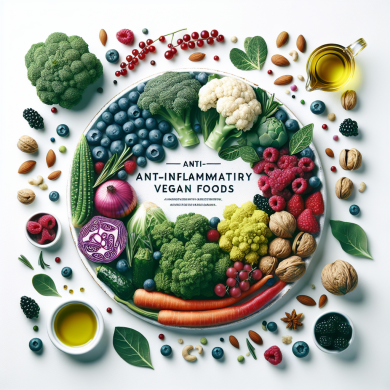






Add comment